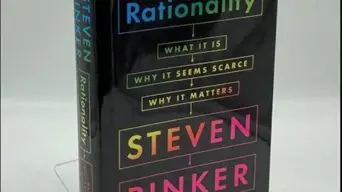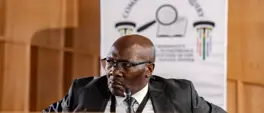Why the world needs more rationality, as a driver of social justice and moral progress
Paula Luckhoff
4 November 2025 | 19:07Gateways Business Consultants' Ian Mann reviews 'Rationality: What It Is, Why It Seems Scarce, Why It Matters' by Steven Pinker.

Rationality by Steven Pinker. X/@DrRafiqRaji
Every week The Money Show interviews the author or reviewer of a new or trending business book.
This week Stephen Grootes talked to regular reviewer Ian Mann, MD of Gateways Business Consultants.
Mann reviewed Rationality: What It Is, Why It Seems Scarce, Why It Matters, a book which is possibly even more relevant today than when it was published four years ago.
It's written by popular science author and experimental cognitive psychologist Steven Pinker, who's lectured at top US universities Harvard and Stanford, as well as the Massachusetts Institute of Technology (MIT).
Pinker asks why, if humanity on the one hand is capable of so much, on the other we are prone to act irrationally.
RELATED: 'Hopeful' book on humans' tribal psychology describes this as our misunderstood superpower
'Rationality matters.
It leads to better choices in our lives and in the publicsphere, and is the ultimate driver of social justice and moral progress.'
As Mann puts it, what Pinker is saying fundamentally, is that behaving rationally is the most important thing we can possibly do as humans.
"The fact that we can make such a mess of things by being illogical, seems to point to the fact that perhaps this idea of the homo sapiens, which means the 'smart homonid', is a bit of a misnomer."
"Pinker starts off with a very interesting contrast, looking at the Khoisan of southern Africa. They are very logical, rational people... with the result that they've been able to survive for thousands of years under very harsh conditions. So, being rational is not a Western thing - it seems like it's a human thing."
"The question is, how can we have achieved so much as humans, like going to the moon and drilling for samples and when we get back to earth we behave like complete idiots most of the time?"
"What makes the book so interesting is that this doesn't have to be the case and that, for the most part, irrationality is almost the lazy man's out."
"Pinker cites a study where puzzles are given out to thousands of MIT students. They look like they are mathematical puzzles, but actually they involve logic. Out of the five questions, these students - who really think they're very mathematically gifted - on average got at least one wrong."
"The author says what happens with people in cases like this has got nothing to do with intelligence but more to do with the fact that we are impulsive, and then don't make good decisions."
"Anything we get used to (e.g. US politics at the moment), we don't worry too much about. We are easily deluded and the only way we can get out of that is making a commitment to WANTING to be more rational. The need is there; we just don't have the desire."
"When we start thinking of rationality as a desideratum, that's when well become more rational... This book also offers techniques to do that, and I found it an an inspiration."
Description on Amazon:
Today humanity is reaching new heights of scientific understanding--and also appears to be losing its mind. How can a species that developed vaccines for Covid-19 in less than a year produce so much fake news, medical quackery, and conspiracy theorizing?
Pinker rejects the cynical cliché that humans are simply irrational--cavemen out of time saddled with biases, fallacies, and illusions. After all, we discovered the laws of nature, lengthened and enriched our lives, and set out the benchmarks for rationality itself. We actually think in ways that are sensible in the low-tech contexts in which we spend most of our lives, but fail to take advantage of the powerful tools of reasoning we’ve discovered over the millennia: logic, critical thinking, probability, correlation and causation, and optimal ways to update beliefs and commit to choices individually and with others. These tools are not a standard part of our education, and have never been presented clearly and entertainingly in a single book--until now.
Rationality also explores its opposite: how the rational pursuit of self-interest, sectarian solidarity, and uplifting mythology can add up to crippling irrationality in a society. Collective rationality depends on norms that are explicitly designed to promote objectivity and truth.
Rationality matters. It leads to better choices in our lives and in the public sphere, and is the ultimate driver of social justice and moral progress. Brimming with Pinker’s customary insight and humor, Rationality will enlighten, inspire, and empower.
Scroll up to the audio player to listen to Mann's review
Get the whole picture 💡
Take a look at the topic timeline for all related articles.
Trending News
More in The Money Show

4 November 2025 20:33
Record-breaking numbers confirm tourism once again driving SA economic growth, says Minister

4 November 2025 19:36
Gambling is robbing South Africans of their financial future, warns new report

4 November 2025 18:41
Mining industry contributed R470 billion to household income in 2024 - Minerals Council











